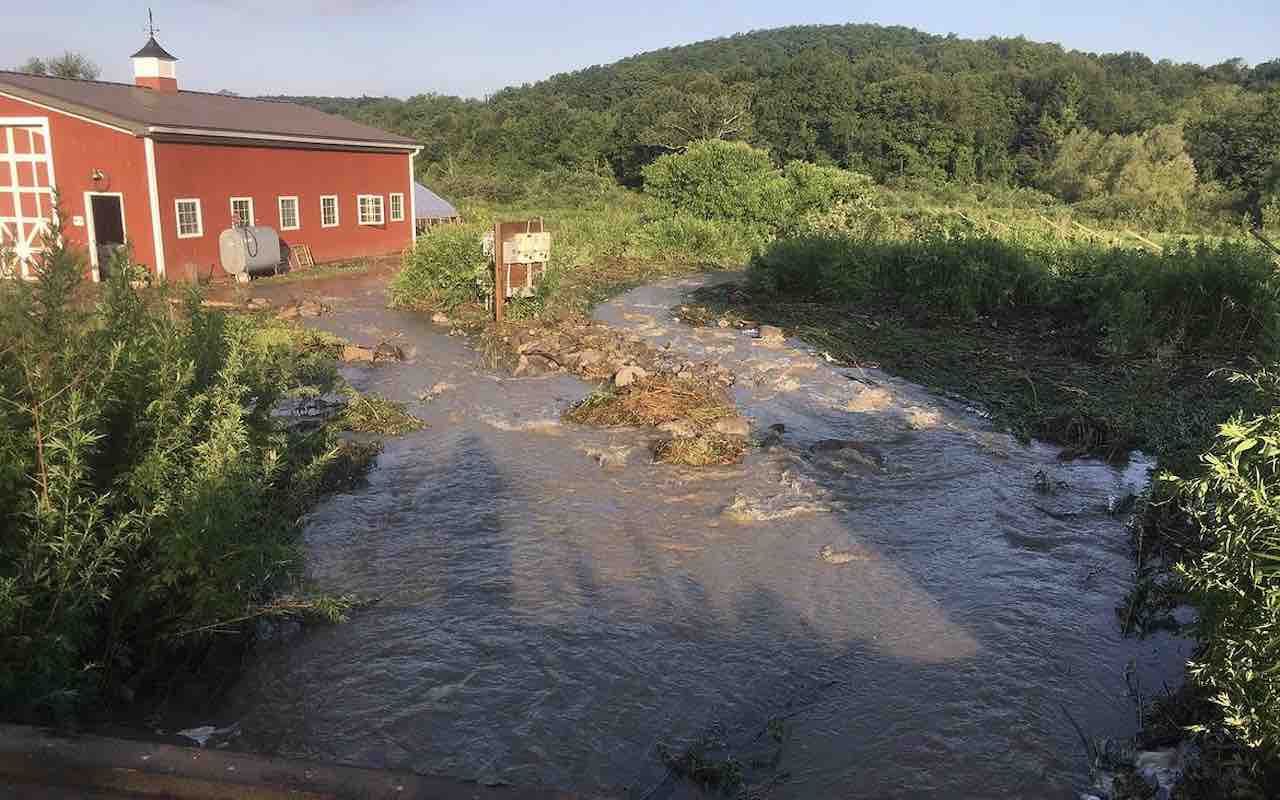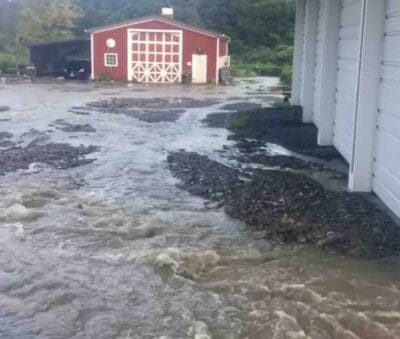Our Environment, Animal Tips & the Great Outdoors

Farms & Flooding: How Full Circus Farm Has Been Navigating the Changing Climate
This is part one of a series of interviews with local farms about how the recent weather conditions have been affecting them and their crops.
Farmers rely on good weather to be able to grow the food that feeds all of us. Extreme weather in any form makes it more difficult for farmers to keep crops alive.
Last summer, many farmers had to deal with the lack of rain and drought conditions that plagued the Northeast for weeks at a time. This made it difficult to maintain healthy soil for plants to grow, and also limited water supplies for farm animals.
This summer, we’re having the opposite problem.
The near constant flood watches/warnings and excessive rain has also been damaging to soil in many ways, including removing the nutrients that are necessary for plants and crops to grow.
According to Corteva Agriscience, “most crops grown in North America are intolerant of flooding,” as excessive rainfall and flooding depletes soil of its oxygen content and “increases disease infections and nitrogen losses.”
Full Circus Farm, located off of Route 199 in Pine Plains, NY, saw a drastic amount of flooding that ended up turning the majority of the farm into a river, including the vegetable field and seedling house. Full Circus Farm owners Miriam Goler and Mark Stonehill say that during the thunderstorms on the evening of July 13th, Full Circus received 5 inches of rain in addition to the 4 inches of rain that they received the previous Sunday, totaling 9 inches of rain in less than a week.
 “The stream running through our property jumped its banks in 4 different places,” say Miriam and Mark. “Because the floodwater was from a stream, most of our produce is no longer sellable.” There are strict federal regulations around flooded crops because of the food safety risk from potential contaminants in floodwater.
“The stream running through our property jumped its banks in 4 different places,” say Miriam and Mark. “Because the floodwater was from a stream, most of our produce is no longer sellable.” There are strict federal regulations around flooded crops because of the food safety risk from potential contaminants in floodwater.
Corteva Agriscience also states that weather conditions following flooding can make or break a crop’s survival. If the conditions are cool and wet, then disease development is more likely. Whereas if the conditions are very hot and windy, then soils may dry out too quickly, cause crusting, and restrict plant growth.
Miriam and Mark say that Full Circus works to improve soil health in an attempt to provide a buffer for the ever-changing weather conditions. They share that they reduce tillage by only tilling the field every other year, they cover cropping, which helps the soil from being eroded and builds soil fertility, and they also spread manure and rotate their chickens through the fields during years when it is not in vegetable production in order to further build soil fertility.
Additionally, Miriam and Mark say that they do most of their field work, with the exception of mowing, with horses instead of tractors to protect the soil by reducing compaction.
“Unfortunately, none of those practices protect us from flooding upstream of our crops, but it does help the soil retain moisture in a drought and absorb water when there is excessive rain,” say Miriam and Mark.
A 2017 study titled, “Unique challenges and opportunities for northeastern US crop production in a changing climate,” states that “water management will be a serious challenge for Northeast farmers in the future, with projections for increased frequency of heavy rainfall events, with projections for increased frequency of heavy rainfall events, as well as projections for more frequent summer water deficits than this historically humid region has experienced in the past.”
Some adaptations that the study recommended back in 2017 include “expanded irrigation capacity, modernized water monitoring and irrigation scheduling, farm drainage systems that collect excess rain water to use as a source during dry periods, and improved soil water holding capacity and drainage.”
Mark and Miriam say that they have started thinking about utilizing a farm pond for irrigation during a drought, and that now they are pivoting and thinking about ways to mitigate flooding.
“It is pretty clear that we need to make some major adaptations to both the farm vision and production systems, as well as major changes to the land if it is going to be feasible for us to keep farming and living in this spot that is vulnerable to flash flooding,” say Mark and Miriam.
Many farms also share that the late frost this season, which occurred in May, created difficulty in planting at the beginning of the season. The study shares that “the extended period of spring frost risk in perennial fruit crops is likely to result from warmer winter and early spring temperatures.”
“We are in a frost pocket, so we hold off on planting frost sensitive plants until late May or early June, but even plants that are usually frost tolerant got hit pretty hard by the freeze,” say Miriam and Mark.
Luckily, Full Circus didn’t lose too many crops, but they noticed that a lot of the plants were set back and taking longer to grow.
As if the constant rain and flooding wasn’t enough to worry about, many local farmers also lamented over the recent poor air quality due to the wildfires in Canada. Mark and Miriam say that the poor air quality has made it more difficult for them to work outside, and while they wear masks as needed, they say it’s a “real drag to wear masks in the summer heat.”
“I’ve thought about climate change a lot with other weather events we’ve had during the 9 seasons we have been growing produce and fruit trees here, but this year felt like a real wake up call in terms of the effects of climate change,” say Miriam and Mark. “After this year, we really feel like we’re on the front line.”
Going forward, you can support Full Circus Farm by purchasing trees from their fruit tree nursery, buying the produce that they have available at Peck’s Market in Pine Plains, and the Chaseholm Farm Store later this summer.
Full Circus Farm
27 Mil’s Path, Pine Plains, NY 12567
(518) 789-0025



